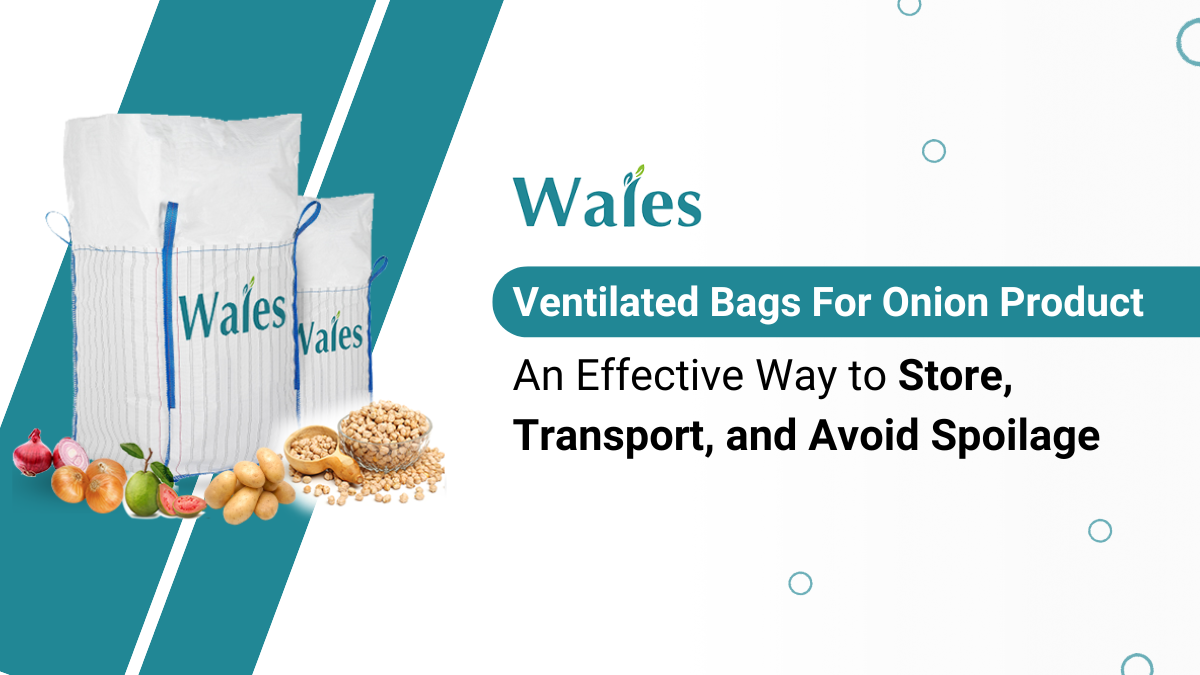
Onions are a universally appealing base product and are in high supply continuously. Though onions are in high demand due to being a basic ingredient, the issue arises in the storage and transportation of onions as they are found to rot, sprout, or go bad.
Most traditional methods of storage and preservation do not serve the purpose in the current supply chain, especially when cultivating and distributing in bulk. Thus, ventilated bags can be utilized. Ventilated bags are also effective and eco-friendly in that they help enhance the storage and transportation of onions. Consequently, lessening waste and increasing the shelf life of the product.
This guide will delve into how ventilated bags efficiently store and transport onion products. In addition, their advantages and how to determine the most appropriate type for your products.
Onions can easily spoil due to environmental factors and get wasted during handling and shipping. Following are the specific challenges faced in the storage and transportation of onion:
These problems underline the importance of unique storage and transport techniques when dealing with onions.
Mesh bags or breathable bags also called ventilated bags, are constructed using strong woven polypropylene material containing several openings that aid aeration. Such bags are made to carry and store agricultural merchandise that need proper ventilation like onions, potatoes, and garlic.
The primary purposes of ventilated bags are:
Ventilated bags meet these key storage and transportation requirements and thus ensure that onions do not spoil and the quality of the product is not compromised.
Onion production and marketing are significantly affected by the risk of spoilage. For ventilated bags, several benefits are presented to help overcome the causes of spoilage. Here’s how they work:
Ventilated bags feature a meshed structure that enables air movement in and out of the bag. This increase in airflow reduces high heat and moisture buildup in the bag, which encourages spoilage. Air circulation reduces high humidity and high temperatures which prevents germination and rotting. Moisture Control
Excess moisture promotes the growth of bacteria and other microbes, which catalyzes the rotting of onions, which is one of the biggest problems in their transportation. The ventilated bags help moisture move out of the onions instead of being absorbed and staying inside. This helps in keeping the onion away from moisture which can prevent the growth of mold.
Temperature Maintenance
Onions have high sensitivity to any temperature changes, and failure to manage the temperature effectively may result in a faster rate of spoilage. Ventilated bags aid in preserving onions at an appropriate temperature by allowing free passage of air that serves to cool the contents and prevent heating. This is more important when the onions are in transit since the onions will be subjected to changes in the ambient temperature.Top Advantages Of Using Ventilated Bags
There are several benefits to the use of ventilated bags for the storage and transportation of onions:
Onion packs with ventilation are preferred when it comes to keeping and carrying onions for quite several reasons:
Undoubtedly ventilated bags are ideal for the storage of onions, but they can also be used to store a wide range of other products from the farm. They are used for packing and transporting tubers such as potatoes, and other crops like garlic and shallots. These bags can also be employed in packing certain types of fruits that require enough aeration, and moisture control.
Ventilated bags are employed in processes where there is a need to restrict the amount of air trapped for example when packaging fired wood and shellfish, and also in bulk storage of dry industrial materials and to prevent moisture condensation.
Enhanced performance can be achieved by choosing the appropriate auger-ventilated bags for the storage and transport of onions. Below are some of the factors to consider while selecting ventilated bags:
Onions can be put to rest in ventilated bags for transporting or storing. These bags offer better circulation, moisture control, and temperature retention to ensure that the onions do not go bad for a longer period. These qualities, coupled with their cost-effectiveness and eco-friendliness, make them ideal for farmers, distributors, and retailers seeking to increase efficiency in their supply chains and minimize product wastage. In cases where onions need to be moved over long distances, or even when they need to be stored for some considerable time, provided ventilated bags will serve the purpose of ensuring that onion products get to the market in the right shape.
Furthermore, Wales Industries is the best FIBC bulk bag manufacturing company in Australia, which is effective in the provision of durable and quality ventilated bags that meet all your agribusiness needs for efficient transportation and storage of onions.